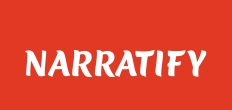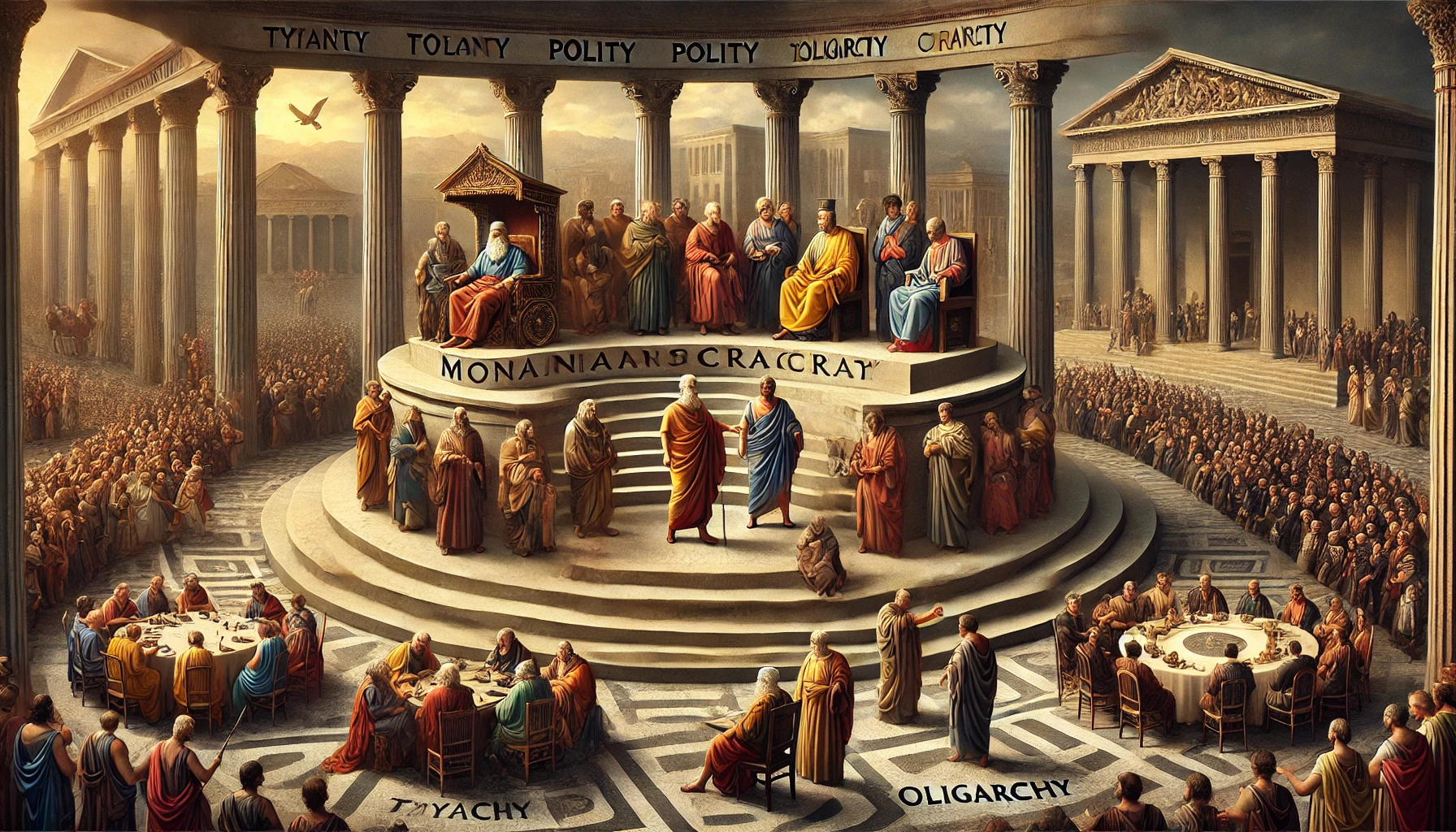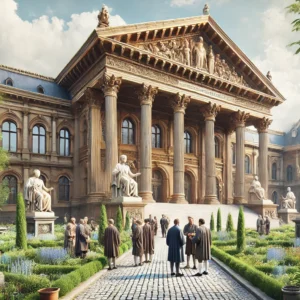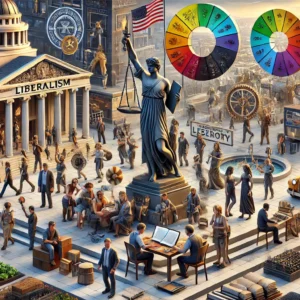Today, we embark on a journey through the intricate world of governance as classified by one of the greatest philosophers of all time, Aristotle. His analysis, rooted in the pursuit of the common good and the avoidance of corruption, offers a timeless understanding of the various forms of government.
In this discourse, we will explore six distinct forms of governance, their defining characteristics, and delve into the reasoning behind Aristotle’s preference for polity over democracy. Through this examination, we aim to uncover the virtues and vices of each system, illustrated with quotes and comparative charts for enhanced comprehension.
Now, let us delve into the six forms of government as identified by Aristotle, starting with Monarchy.
The Six Forms of Government
Monarchy: Rule by One in the Interest of All
Definition: Monarchy is a form of government where a single individual rules with the intent of benefiting all citizens.
Characteristics:
- Leadership: One ruler (a king or queen) with supreme authority.
- Objective: The welfare of all subjects.
- Virtue: The ruler possesses wisdom and virtue, ensuring just governance.
Quote: “A king should rule with the utmost virtue, guiding his people with wisdom and fairness.”
Aristocracy: Rule by a Few in the Interest of All
Definition: Aristocracy is the governance by a select group of individuals who are chosen based on their virtue and wisdom, aiming to serve the common good.
Characteristics:
- Leadership: A small group of virtuous and wise individuals.
- Objective: The welfare of the community.
- Virtue: The leaders are known for their moral and intellectual excellence.
Quote: “The best shall govern, and their wisdom shall benefit all.”
Polity: Rule by Many in the Interest of All
Definition: Polity is a mixed form of government where many individuals participate in governance, ensuring that the common good is prioritized.
Characteristics:
- Leadership: A large group of citizens, typically the middle class.
- Objective: The common good and stability of the state.
- Virtue: Citizens participate with a sense of duty and justice.
Quote: “The middle class, being the most stable and least prone to faction, is the best suited to rule.”
Tyranny: Rule by One in the Interest of the Ruler
Definition: Tyranny is the perversion of monarchy, where a single ruler governs for personal gain rather than the welfare of the citizens.
Characteristics:
- Leadership: One ruler with absolute power.
- Objective: The self-interest of the ruler.
- Vice: The ruler often exploits and oppresses the populace.
Quote: “Tyranny is the worst form of government, as it seeks only the benefit of the ruler, not the ruled.”
Oligarchy: Rule by a Few in the Interest of the Rulers
Definition: Oligarchy is the perversion of aristocracy, where a small group of individuals govern for their own benefit rather than the common good.
Characteristics:
- Leadership: A small group of wealthy and powerful individuals.
- Objective: The self-interest of the ruling few.
- Vice: The rulers prioritize their own wealth and power over the welfare of the citizens.
Quote: “Oligarchy arises when the rich rule and the poor have no voice.”
Democracy: Rule by Many in the Interest of the Rulers
Definition: Democracy, in its perverted form, is the rule by many with the intent of benefiting themselves rather than the community as a whole.
Characteristics:
- Leadership: The majority, often the poorer classes.
- Objective: The self-interest of the majority.
- Vice: Decisions are often made based on immediate desires rather than long-term benefits.
Quote: “Democracy can degenerate into rule by the poor, where decisions are driven by self-interest and not the common good.”
Comparative Analysis
Now, let us create a comparative chart to illustrate the differences and similarities between these forms of government.
| Form of Government | Leadership | Objective | Virtue/vice |
| Monarchy | One ruler | Welfare for all | Virtue: Wisdom and fairness |
| Aristocracy | Few Virtuous Individuals | Welfare for all | Virtue: Moral and intellectual excellence |
| Polity | Many Citizens(middle class) | Common good | Virtue: sense of duty and Justice |
| Tyranny | One ruler | Self -interest of the ruler | Vice: exploitation and oppression |
| Oligarchy | Few Wealthy individuals | Self interest of the ruler | Vice: wealth and power over welfare |
| Democracy | Many (majority , often poor) | Self -interest of the ruler | Vice: Decision based on immediate desire |
Polity: The Preferred Form of Government
Among these forms of government, I prefer polity over democracy. Let us explore the reasons for this preference.
Stability and Middle Class
Reason: Polity is primarily governed by the middle class, which is the most stable and least prone to factionalism. The middle class often acts with a balanced perspective, avoiding the extremes of wealth and poverty.
Quote: “The middle class is the best suited to rule, for they are neither rich nor poor, and thus maintain a stable and just governance.”
Common Good
Reason: In a polity, the common good is prioritized. The many who participate in governance do so with a sense of duty and justice, ensuring that decisions benefit the entire community.
Quote: “In a polity, the common good is upheld, and the many govern with a sense of responsibility.”
Prevention of Corruption
Reason: Polity is less susceptible to corruption compared to democracy, where decisions may be driven by the immediate desires of the majority. In a democracy, there is a risk of populism and short-term thinking, which can undermine long-term stability.
Quote: “Democracy can lead to rule by the poor, where self-interest prevails over the common good. Polity, however, ensures governance with integrity
While Aristotle considered polity the ideal form of government due to its balance and emphasis on the common good, democracy is widely adopted today because it embodies the principle of popular sovereignty and inclusivity. Modern democracies ensure that power resides with the people, promoting accountability, protection of individual rights, and participation from a diverse citizenry. This framework addresses the challenges of corruption and tyranny more effectively, fostering stability and fairness in complex societies. Democracy’s adaptability and emphasis on equal representation make it a practical and enduring choice for governance across the world.
Polity, as conceived by Aristotle, is a mixed form of government that combines elements of oligarchy and democracy, aiming to achieve a balance that promotes the common good and minimizes the risk of corruption. While theoretically appealing, several practical and historical reasons explain why modern countries do not widely adopt polity in its pure form:
Complexity in Implementation
- Polity requires a delicate balance between different social classes and governing bodies, which can be challenging to establish and maintain. Modern political systems often find it difficult to create and sustain this balance without leading to power struggles or gridlock.
Evolution of Democratic Ideals:
- Over time, democratic principles emphasizing equal representation, individual rights, and popular sovereignty have become deeply entrenched. The democratic process, with its direct and representative forms, offers a more straightforward mechanism for ensuring these principles than the more complex structure of polity.
Historical Context and Development:
- The development of modern nation-states has been influenced by historical events, revolutions, and philosophical advancements that have shaped contemporary governance models. The Enlightenment, for instance, championed democratic ideals, which became foundational for modern political systems.
Flexibility and Adaptability:
- Democracies have shown a remarkable ability to adapt to changing social, economic, and political conditions. This adaptability makes democracy more appealing as it can evolve with the needs and values of society. Polity, in contrast, might be seen as less flexible due to its need for maintaining a specific balance.
Institutional Structures:
- Modern democracies benefit from well-established institutions like free press, independent judiciary, and regular elections, which provide checks and balances. These institutions help mitigate the risks Aristotle associated with democracy, such as populism and short-term thinking, making pure polity less necessary.
Global Influence and Spread:
- The success and influence of democratic nations, particularly in the West, have set a precedent that other countries aspire to follow. The promotion of democracy through international organizations and foreign policies has further entrenched democratic governance as the preferred model globally.
Economic Considerations
- Democracies often provide a stable environment for economic growth and innovation, attracting investment and fostering development. The clear and transparent governance structures typical of democracies are appealing to both domestic and international stakeholders.
In summary, while Aristotle’s concept of polity offers a balanced and theoretically sound form of governance, the practicalities of modern political development, the entrenched nature of democratic ideals, and the adaptability and institutional robustness of democracy have led most countries to favor democratic forms of government. These factors collectively make democracy a more viable and effective means of governance in the contemporary world.





